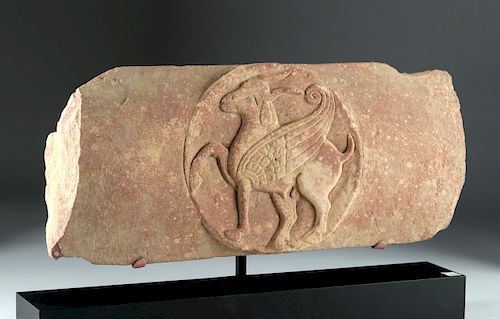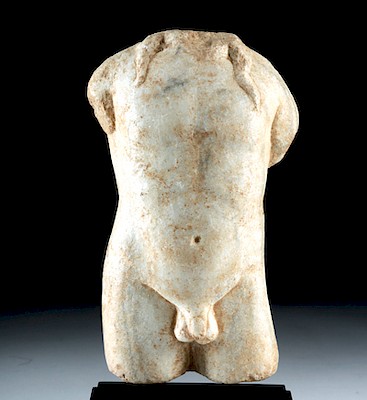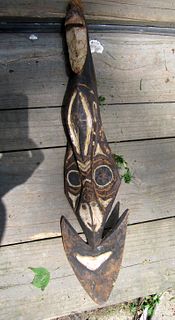1st C. Indian Red Sandstone Crossbar w/ Winged Goat
Lot 70a
About Seller
Artemis Gallery
686 S Taylor Ave, Ste 106
Louisville, CO 80027
United States
Selling antiquities, ancient and ethnographic art online since 1993, Artemis Gallery specializes in Classical Antiquities (Egyptian, Greek, Roman, Near Eastern), Asian, Pre-Columbian, African / Tribal / Oceanographic art. Our extensive inventory includes pottery, stone, metal, wood, glass and textil...Read more
Categories
Estimate:
$5,000 - $7,500
Absentee vs Live bid
Two ways to bid:
- Leave a max absentee bid and the platform will bid on your behalf up to your maximum bid during the live auction.
- Bid live during the auction and your bids will be submitted real-time to the auctioneer.
Bid Increments
| Price | Bid Increment |
|---|---|
| $0 | $25 |
| $300 | $50 |
| $1,000 | $100 |
| $2,000 | $250 |
| $5,000 | $500 |
| $10,000 | $1,000 |
| $20,000 | $2,500 |
| $50,000 | $5,000 |
| $100,000 | $10,000 |
| $200,000 | $20,000 |
About Auction
By Artemis Gallery
Dec 5, 2018
Set Reminder
2018-12-05 10:00:00
2018-12-05 10:00:00
America/New_York
Bidsquare
Bidsquare : DAY 1 | Classical Antiquities & Asian Art
https://www.bidsquare.com/auctions/artemis-gallery/day-1-classical-antiquities-asian-art-3698
Day 1 of an important 2-day auction featuring ancient and ethnographic art from around the world. Egyptian, Greek, Roman, Viking, Near Eastern plus Asian Art from China, Japan, Thailand, Vietnam, Burma, India, more. Artemis Gallery info@artemisgallery.com
Day 1 of an important 2-day auction featuring ancient and ethnographic art from around the world. Egyptian, Greek, Roman, Viking, Near Eastern plus Asian Art from China, Japan, Thailand, Vietnam, Burma, India, more. Artemis Gallery info@artemisgallery.com
- Lot Description
Central Asia, India, Uttar Pradesh, Mathura, Kushan Period, ca. late 1st to 2nd century CE. A hand-carved red and ochre sandstone cross bar with a rounded front face, planar sides, and acutely-angled top and bottom peripheries. The preeminent decorative element is a mythical winged goat carved in low relief central to a large roundel with one raised leg as if prancing just before taking flight. Four delineated legs with stylized hooves, a powerful body with dangling genitalia, and a curving tail comprise the mammalian features, with a singular incised feathered wing projecting upwards and terminating in a tight spiral. The whimsical animal's aloof visage is defined by circular eyes and a pair of curved horns extending outwards opposite the conical snout. This carving would have served as an architrave spanning above the tops of two columns, possibly serving as part of a doorway within a shrine or monastery site. Custom museum-quality display stand included. Size: 18.5" W x 8" H (47 cm x 20.3 cm); 11.5" H (29.2 cm) on included custom stand.
The depiction of the winged goat is one of great significance steeped in Hindu mythology. All manner of animals were not merely creatures that roamed the earth without responsibility; when called upon, they were employed as "Vahanas," spiritual mounts or vehicles used to transport the many deities from realm to realm. For example, "the Brhatsamhita mentions such vahanas as a peacock for Kartikeya, a white four tusked elephant for Indra, a buffalo for Yama, a swan for Varuna, and so on." (Ganguli, Kalyan Kumar. "The Concept of Vahana in Indian Iconography." Proceedings of the Indian History Congress, vol. 28, 1966, p. 107., www.jstor.org/stable/44140400) The goddess Kali is said to have used a majestic black goat for her mount, and goats are still sacrificed in her honor in India to this day.
For a stylistically-similar example depicting a winged lion, please see the Victoria and Albert Museum, number IM.1-1927: http://collections.vam.ac.uk/item/O84193/architectural-fragment-unknown/
A pair of stylistically-similar examples depicting a lion and a sea monster hammered for $7,768 at Christie's, New York "Indian and Southeast Asian Art including 20th Century Indian" Auction (sale 1115, September 19, 2002, lot 35): https://www.christies.com/lotfinder/lot/a-rare-pair-of-red-sandstone-crossbars-3969913-details.aspx?from=searchresults&intObjectID=3969913&sid=823558f8-104b-4be6-ad39-d38a275c8396
Provenance: private East Coast, USA collection
All items legal to buy/sell under U.S. Statute covering cultural patrimony Code 2600, CHAPTER 14, and are guaranteed to be as described or your money back.
A Certificate of Authenticity will accompany all winning bids.
We ship worldwide and handle all shipping in-house for your convenience.
#135412Surface wear and abrasions commensurate with age as expected, small chips to peripheries, roundel, and goat, with some light encrustations. Light earthen deposits throughout. Verso is rough from carving. Old inventory label on verso of stone.Condition
- Shipping Info
-
All shipping is handled in-house for your convenience. Your invoice from Artemis Gallery will include shipping calculation instructions. If in doubt, please inquire BEFORE bidding for estimated shipping costs for individual items.
-
- Buyer's Premium



 EUR
EUR CAD
CAD AUD
AUD GBP
GBP MXN
MXN HKD
HKD CNY
CNY MYR
MYR SEK
SEK SGD
SGD CHF
CHF THB
THB














